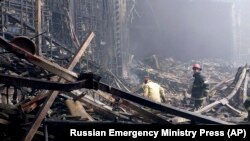The suburban Moscow music hall where gunmen opened fire on concertgoers was a blackened, smoldering ruin Saturday as the death toll in the attack surpassed 130 and Russian authorities arrested four suspects.
President Vladimir Putin claimed they were captured while fleeing to Ukraine.
Kyiv strongly denied any involvement in Friday's assault on the Crocus City Hall music venue in Krasnogorsk, and the Islamic State group claimed responsibility.
U.S. intelligence officials have intelligence that the Islamic State group's Afghan affiliate, IS-Khorasan, is responsible for the Moscow attack.
Putin did not mention the Islamic State group in his speech to the nation, and Kyiv accused him and other Russian politicians of falsely linking Ukraine to the assault to stoke fervor for Russia's war in Ukraine, which recently entered its third year.
"ISIS bears sole responsibility for this attack. There was no Ukrainian involvement whatsoever," National Security Council spokesperson Adrienne Watson said in a statement.
The U.S. shared information with Russia in early March about a planned terrorist attack in Moscow, tied to a threat by IS-Khorasan, and issued a public warning to Americans in Russia, Watson said.
Authorities detain 11, says Putin
Putin said authorities detained 11 people in the attack, which also wounded more than 100. He called it "a bloody, barbaric terrorist act" and said Russian authorities captured the four suspects as they were trying to escape to Ukraine through a "window" prepared for them on the Ukrainian side of the border.
Ukrainian President Volodymyr Zelenskyy angrily rejected Moscow's accusations as an attempt by Putin and his lieutenants to shift the blame to Ukraine while treating their own people as "expendables."
"They are burning our cities — and they are trying to blame Ukraine," he said in a statement on his messaging app channel. "They torture and rape our people — and they blame them. They drove hundreds of thousands of their terrorists here to fight us on our Ukrainian soil, and they don't care what happens inside their own country."
Russian media broadcast videos that apparently showed the detention and interrogation of the suspects, including one who told the cameras he was approached by an unidentified assistant to an Islamic preacher via a messaging app and paid to take part in the raid.
Russian news reports identified the gunmen as citizens of Tajikistan, a former Soviet republic in Central Asia that is predominantly Muslim and borders Afghanistan. As many as 1.5 million Tajiks have worked in Russia and many have Russian citizenship.
Tajikistan's foreign ministry, which denied initial Russian media reports that mentioned several other Tajiks allegedly involved in the raid, did not immediately respond to a request for comment about the arrests.
Many Russian hard-liners called for a crackdown on Tajik migrants, but Putin appeared to reject the idea, saying "no force will be able to sow the poisonous seeds of discord, panic or disunity in our multi-ethnic society."
He declared Sunday a day of mourning and said additional security measures were imposed throughout Russia.
The number of dead stood at 133, making the attack the deadliest in Russia in years. Authorities said the toll could still rise.
The raid was a major embarrassment for the Russian leader and happened just days after he cemented his grip on the country for another six years in a vote that followed the harshest crackdown on dissent since the Soviet times.
Some commentators on Russian social media questioned how authorities, who have relentlessly suppressed any opposition activities and muzzled independent media, failed to prevent the attack despite the U.S. warnings.
Attack comes after warning
The assault came two weeks after the U.S. Embassy in Moscow issued a notice urging Americans to avoid crowded places in view of "imminent" plans by extremists to target large Moscow gatherings, including concerts. Several other Western embassies repeated the warning. Earlier this week, Putin denounced the warning as an attempt to intimidate Russians.
Investigators on Saturday combed through the charred wreckage of the hall for more victims. Hundreds of people stood in line in Moscow to donate blood and plasma, Russia's health ministry said.
Images shared by Russian state media showed emergency vehicles still gathered outside the ruins of the concert hall, which could hold more than 6,000 people and hosted many big events.
Dave Primov, who survived the attack, told the AP that the gunmen were "shooting directly into the crowd" in the front rows. He described the chaos in the hall as concertgoers raced to escape: "People began to panic, started to run and collided with each other. Some fell down and others trampled on them."
After he and others crawled out of the hall into nearby utility rooms, he said he heard pops from small explosives and smelled burning as the attackers set the building ablaze. By the time they got out of the massive building 25 minutes later, it was engulfed in flames.
"Had it been just a little longer, we could simply get stuck there in the fire," Primov said.
Messages of outrage, shock and support for the victims and their families streamed in from around the world.
White House press secretary Karine Jean-Pierre said in a statement that the U.S. condemned the attack and noted that the Islamic State group is a "common terrorist enemy that must be defeated everywhere."




